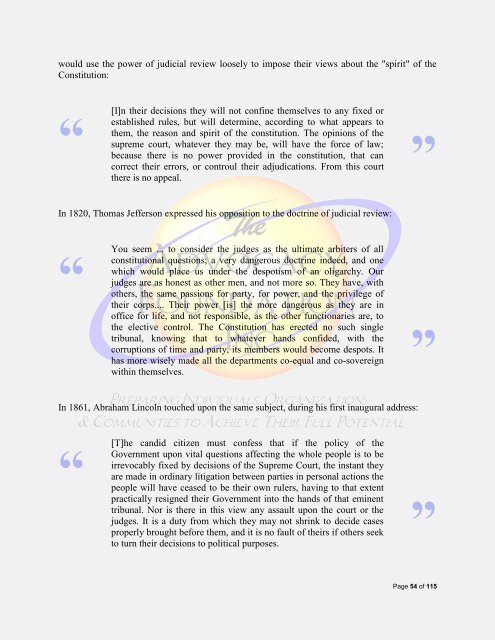Judicial ReEngineering
Judicial ReEngineering
Judicial ReEngineering
You also want an ePaper? Increase the reach of your titles
YUMPU automatically turns print PDFs into web optimized ePapers that Google loves.
would use the power of judicial review loosely to impose their views about the "spirit" of the<br />
Constitution:<br />
“<br />
[I]n<br />
their decisions they will not confine themselves to any fixed or<br />
established rules, but will determine, according to what appears to<br />
them, the reason and spirit of the constitution. The opinions of the<br />
supreme court, whatever they may be, will have the force of law;<br />
because there is no power provided in the constitution, that can<br />
correct their errors, or controul their adjudications. From this court<br />
there is no appeal.<br />
”<br />
In 1820, Thomas Jefferson expressed his opposition to the doctrine of judicial review:<br />
“<br />
You<br />
seem ... to consider the judges as the ultimate arbiters of all<br />
constitutional questions; a very dangerous doctrine indeed, and one<br />
which would place us under the despotism of an oligarchy. Our<br />
judges are as honest as other men, and not more so. They have, with<br />
others, the same passions for party, for power, and the privilege of<br />
their corps.... Their power [is] the more dangerous as they are in<br />
office for life, and not responsible, as the other functionaries are, to<br />
the elective control. The Constitution has erected no such single<br />
tribunal, knowing that to whatever hands confided, with the<br />
corruptions of time and party, its members would become despots. It<br />
has more wisely made all the departments co-equal and co-sovereign<br />
within themselves.<br />
”<br />
In 1861, Abraham Lincoln touched upon the same subject, during his first inaugural address:<br />
“<br />
[T]he<br />
candid citizen must confess that if the policy of the<br />
Government upon vital questions affecting the whole people is to be<br />
irrevocably fixed by decisions of the Supreme Court, the instant they<br />
are made in ordinary litigation between parties in personal actions the<br />
people will have ceased to be their own rulers, having to that extent<br />
practically resigned their Government into the hands of that eminent<br />
tribunal. Nor is there in this view any assault upon the court or the<br />
judges. It is a duty from which they may not shrink to decide cases<br />
properly brought before them, and it is no fault of theirs if others seek<br />
to turn their decisions to political purposes.<br />
”<br />
Page 54 of 115

















